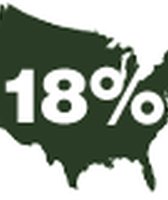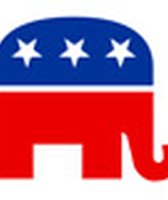Stand up for the facts!
Our only agenda is to publish the truth so you can be an informed participant in democracy.
We need your help.
I would like to contribute
SUMMARY: McCain and other Republicans cite a National Journal rating to claim that Obama is the Senate's No. 1 liberal. But other measurements tell a different story.
It's a line you'll hear many times from Sen. John McCain over the next five months: "In just a few years in office, Sen. Obama has accumulated the most liberal voting record in the Senate."
But McCain's campaign also pointed out recently that Barack Obama votes with President Bush about half the time.
So the biggest liberal in the Senate is a solid supporter of President Bush? What gives?
Actually, there's some truth to both claims. The political magazine National Journal rated Obama the most liberal senator for 2007, while Congressional Quarterly calculated that Obama voted with Bush 40 to 50 percent over the past two years.
McCain's seemingly contradictory claims illustrate the limitations of congressional ratings. Although they can provide a quick snapshot of someone's voting record, the ratings have many shortcomings, political scientists say.
"They can give a good inkling of whether someone is liberal or conservative, but they're not good enough for a precise determination of what someone's ideology is," said Josh Clinton, a political science professor at Princeton University.
'Obama the liberal'
You'll be hearing a lot about "Obama the liberal" between now and November.
It's a standard technique from the Republican playbook: brand Democratic opponents as "tax-and-spend liberals."
Back in January, when National Journal released its vote ratings, it gave Republicans some fresh ammunition to use the term against Obama. The nonpartisan magazine, which in 2004 had determined the Senate's No. 1 liberal was also a presidential candidate — John Kerry — published a story headlined "Obama: Most Liberal Senator in 2007."
Within hours of the rating's release, the Republican National Committee issued a fact sheet: "Obama: #1 Liberal Senator." Since then, McCain and many other Republicans have often cited the National Journal rating. Last week, Rep. Dan Boren, a Democrat from Oklahoma, cited the rating in explaining why he would not support Obama.
Yet other ratings paint a different picture.
Voteview.com, a site created by political scientists that plots lawmakers on a liberal-conservative scale based on their voting patterns, calculated there were nine senators more liberal than Obama in the current Congress.
"Obama is a liberal, but he's not the most liberal," said Keith Poole, a University of California-San Diego professor who runs the site. By comparison, McCain is the eighth-most conservative. Ratings from Congressional Quarterly also provide a mixed picture.
In CQ's calculation of party unity, which measures how often members vote with their party on bills where the parties split, Obama got a 97 percent rating last year. Ten Democrats had higher scores. On votes where Bush indicated his position, CQ found Obama supported the Republican president 40 percent of the time in 2007. That 40 percent rating put Obama in the middle of the pack for Democrats. In 2006, Obama voted with Bush 49 percent of the time.
McCain had the Senate's highest presidential support score last year, 95 percent, but he missed more than half of the votes because he was campaigning. And McCain hasn't always been such a strong backer of President Bush. He supported Bush 77 percent in 2005 and has averaged 89 percent since 2001.
A quick primer on the ratings
National Journal , Voteview and CQ use very different approaches.
National Journal relies largely on the judgment of its editors and reporters. They choose votes that they believe show ideological distinctions (they chose to include 99 of the 442 Senate votes last year) and they decide which side in the vote is liberal and which is conservative. Then they compute how often senators and House members vote each way.
"We're trying to pick votes where some ideological differences are displayed and show how members of Congress line up relative to one another," said Charles Green, editor of the magazine.
CQ takes a more empirical approach and calculates how often members vote with their party or the president.
"We don't try to establish a litmus test or ideological label," said John Cranford, CQ's national editor. "What we're looking for is something that more closely represents how members might characterize their vote, such as how often they vote with the president."
Voteview uses a complicated calculation based on patterns of how often each member of Congress votes with other members. The program determines the patterns from hundreds of votes and plots each member on a liberal-conservative spectrum.
Labor unions and advocacy groups do their own congressional ratings, usually based on a small number of votes on their key issues. Their ratings not only provide voter's scorecard of senators and House members who support their causes, but the ratings themselves are used as a lobbying tool. Typically, the groups alert lawmakers when a vote will be included in their ratings which, depending on the heft of the group, can influence the way some lawmakers vote.
"They are not picking votes in an objective way to assess where a member is on an issue," said Clinton, the Princeton professor. "They want to exercise leverage."
Martin Frost, a former Democratic member of Congress from the Dallas-Fort Worth area, is more blunt about the groups' motives in alerting members about the ratings.
Those calls, Frost said, are "meant to be a threat."
How accurate?
Political scientists caution that all ratings have limitations — the biggest being that they are based on the congressional agenda, which is set by the party in control. That can skew the votes so they don't fairly represent a member's ideology.
For example, a senator who is liberal on social issues but conservative on economic topics can have his or her overall "score" distorted if there are many votes on social-issue bills but few on economic ones.
Likewise, missed votes can weaken the value of the results. Because Obama was campaigning, he missed 33 of the 99 votes that National Journal rated. McCain missed so many the magazine decided not to give him an overall rating.
Obama complained about the way National Journal categorizes votes as liberal or conservative. He said he disagreed, for example, with the judgment of the magazine that his vote to establish a Senate office of public integrity should be considered a liberal vote.
Obama said party scores reflect the partisan nature of Congress.
"It is true that when you look at some of the votes that I've taken in the Senate that I'm on the Democratic side of these votes," he said in an April TV interview. "But part of the reason is because the way these issues are designed are to polarize. They're intentionally designed to polarize."
The Voteview approach is widely praised by political scientists because it has been very accurate at predicting how members vote. But Poole acknowledges his liberal-conservative scale doesn't fully capture the complexity of lawmakers' viewpoints.
"American politics is a philosophical mess in that there is no philosophical coherence to political parties. The parties are just groups of issue positions," he said.
Green, the National Journal editor, says voters shouldn't rely on a single rating to determine a candidate's ideology.
"There's pluses and minuses to each rating system. If you look at a number of them, I think you have a pretty good picture," he said.
Thomas Mann, a senior fellow at the Brookings Institution, a political think tank, said they have limited value.
"This is a case," he said, "where statistics can do more harm than good."
Our Sources
McCain campaign, Remarks of John McCain in New Orleans, June 3, 2008
National Journal, Obama: Most Liberal Senator in 2007, Jan. 31, 2008
Americans for Democratic Action, ADA's 2006 Congressional Voting Record, February 2007
Americans for Democratic Action, ADA's 2007 Congressional Voting Record, February 2008
Voteview.com, 110th Senate Rank Ordering, Jan. 2, 2008
E-mail from McCain spokesman Brian Rogers, "The National Journal Rated Obama the Most Liberal Senator in 2007"
Congressional Quarterly, 2006 Vote Studies, Jan. 1, 2007
Congressional Quarterly, 2007 Vote Studies, Jan. 14, 2008
Interviews: Geoffrey Nunberg, author of Talking Right; Charles Green, editor of National Journal; John Cranford, national editor of Congressional Quarterly














































